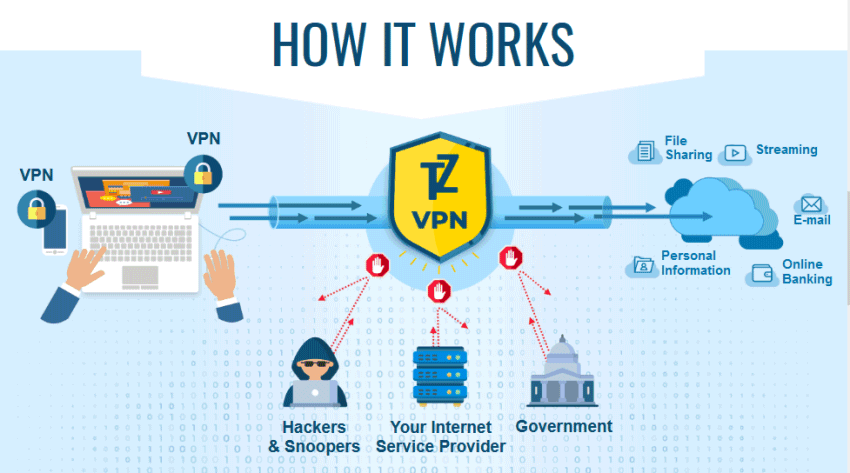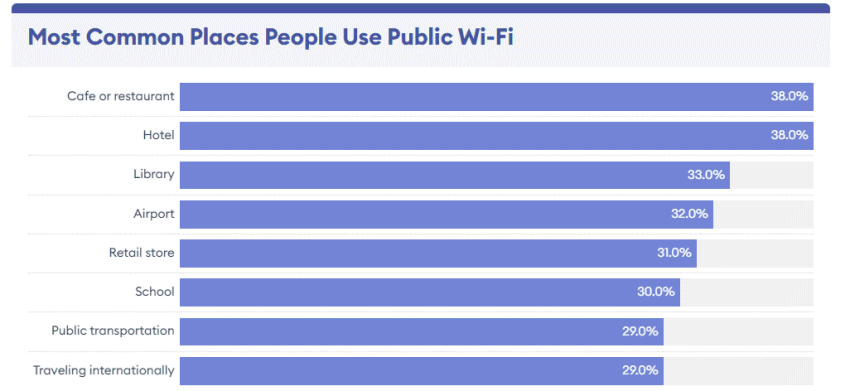You’ve no doubt heard the term VPN before. This is hardly surprising; consumers and businesses are becoming increasingly aware of how important their privacy is and the need to protect their data. This awareness has, in part, grown due to the rise in cyber-attacks and data breaches in recent years.
What’s more, cybercrime is expected to increase in the coming years, with its cost estimated to reach 17.65 trillion US dollars in 2025.
For this reason, many turn to security tools such as VPNs to protect themselves from cybercrime. This article will take you through what a VPN is, how it works, and how exactly it helps with data protection.
VPN stands for Virtual Private Network.
A VPN establishes a connection between a computer and the internet. It does so by directing the IP address through a server that is run by the VPN host.

This way, your online activity cannot be seen by your Internet Service Provider (ISP) or other third parties; this includes websites that you access and data that is exchanged.
A VPN also scrambles your data using encryption so that even if someone were to get their hands on your data, it would be useless.
Also, it can help you get past certain firewalls, bypass geo-blocking, and access content that would normally be restricted.
At its simplest, encryption signifies the process of turning data into code. Many software and applications use it, such as secure remote access solutions, to ensure the security of data.
VPN encryption’s purpose is to keep information private and secure. When data is transmitted over the internet, it is at risk of being intercepted and read by scammers or cyberattackers, for instance. A VPN encrypts this data to ensure that it is inaccessible to anyone but the intended recipients.
People and businesses alike use VPNs to keep online activity private, protect their data, and secure their internet experience.
Simply put, a VPN creates a tunnel through which data can be sent and received. This tunnel is encrypted and does not allow parties other than the recipient to see or access this data.
An individual will connect to a VPN before beginning to browse the internet. This VPN creates an encrypted tunnel through which data can safely pass.
The data is “scrambled” in such a way as to be unreadable to others. VPN encryption takes the plain text and turns it into ciphertext; how complicated this text is depends on the type of encryption that the VPN service uses.
The only way to unscramble it is with the correct key; of course, the individual has the private key needed to decode the data when it reaches their computer.
Data protection is a serious topic—that’s why the United Kingdom has the Data Protection Act, and the US has hundreds of laws dedicated to data protection legislation.
No one wants to browse the internet and worry about who can access their activities and private information. Similarly, businesses want to be able to use any technology tools with the peace of mind that their data is safe.
That’s why, when looking for remote support tools, for example, a company’s prime concerns will include whether the software uses encryption to ensure the safety of its information.
As we’ve just covered, VPNs encrypt tunnels through which data can safely pass. This is useful for many elements of data protection; you’ll find a list below that outlines how.
VPN encryption keeps all your data safe and away from prying eyes, including private details surrounding your identity, financial information, and internet activity, such as private online chats and browsing history.
Moreover, VPN encryption stops third parties, such as apps or websites, from being able to track your activity. Security concerns such as DNS leaks can be prevented; such leaks are a threat as they can expose your browsing history and location.
Since VPN encryption scrambles your data, any information transmitted with the use of a VPN will be safe and secure.
Therefore, there are no worries about third-party interceptions when you are exchanging data. Any financial information you input, for example, is kept safe.
Many of us have connected to public networks without a second thought. The unfortunate truth is that these networks are often very vulnerable to cyberattacks.

According to a recent study, 40% of respondents had their information compromised while using public Wi-Fi. What’s more, public networks are very often used, especially in busy places such as airports and restaurants, and this is when information is most likely to be compromised.
VPN encryption lets you connect to public networks with peace of mind. Since your data will be encrypted and safe, even if hackers are looking to access your information, they won’t be able to decode it.
Just as third parties and hackers can't view your online activity and data, they also cannot alter it, since it is encrypted from the moment it enters the tunnel to when it leaves.
The good news with this is that you can be sure that the data you send and receive is sound and unchanged.
A VPN is a great security tool that can help you avoid falling for phishing scams, ransomware, and other online attacks.
VPN encryption is a crucial element of a VPN that renders your data inaccessible to any unauthorized party. This means that you can surf the internet without worrying about your online activity and sensitive information being intercepted by third parties or cyber criminals.